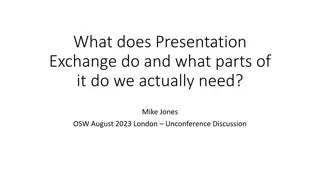
Exploring Emerging Opportunities in Global Health with Dr. Andres G. Lescano
Discover the expertise of Dr. Andres G. Lescano, a dedicated epidemiologist focusing on emerging diseases, climate change, and parasitic infections in Peru. Learn about his impactful work, outbreak investigations, and extensive experience in training global health professionals. Uncover Peru's potential in ecologic diversity and pathogen research, alongside valuable insights into outbreak investigation steps.
Download Presentation

Please find below an Image/Link to download the presentation.
The content on the website is provided AS IS for your information and personal use only. It may not be sold, licensed, or shared on other websites without obtaining consent from the author. If you encounter any issues during the download, it is possible that the publisher has removed the file from their server.
You are allowed to download the files provided on this website for personal or commercial use, subject to the condition that they are used lawfully. All files are the property of their respective owners.
The content on the website is provided AS IS for your information and personal use only. It may not be sold, licensed, or shared on other websites without obtaining consent from the author.
E N D
Presentation Transcript
Emerging Opportunities in Global Health Andres G. (Willy) Lescano, PhD, MHS, MHS Associate Professor, Universidad Peruana Cayetano Heredia Adjunct Professor at Tulane, Wake Forest, Johns Hopkins and Texas Medical Branch University Head, Emerge , Emerging Diseases and Climate Change Research Unit Sponsored by training grant NIH/FIC D43 TW007393
El burro por delante (a bit about myself) Quantitative ID field epidemiologist Worked for nearly 25 years, mostly in Peru: PRISMA NGO, Cayetano University and NAMRU-6 Research in parasites & emerging infections. Epi capacity building (~115 publications, H-index: 18) Interests: emerging diseases & climate change, parasitic infections, surveillance & outbreak response
Perus potential and role High ecologic/pathogen diversity. Large Amazonic region Intense travel, migration and tourism No emerging diseases academic reference center, only public (INS) and international one (NAMRU-6) Multiple, recently emerged/diagnosed pathogens Little explored vectors and reservoirs
Outbreak Investigation Training Hands-on, five-day classroom-based course >1600 students from 15 countries trained in >40 courses Standardized, validated curricula in multiple formats & languages Collaborates with Ministries of Health, PAHO/WHO, CDC & USAID Served as model for multiple other training programs
Steps of an outbreak Investigation (CDC 3030g, Reingold 1998) Establish the existence of an outbreak Verify the diagnosis Define and identify cases Perform descriptive epidemiology Determine who is at risk Develop hypotheses Evaluate hypotheses Refine hypotheses and conduct additional studies Implement prevention and control measures 10. Communicate the findings 1. 2. 3. 4. 5. 6. 7. 8. 9.
Diverse, exciting opportunities Just come Clinical rotations, with research components Field and laboratory research With universities, research centers or NGOs Medical missions, including surgical or even non-medical MSF, academic, faith-based Public health: surveillance, outbreak investigation & response, program evaluation Working with the host country government
Stay and commit Most productive if staying a long time, avoid voluntourism Very difficult in early career stage Try to establish a long-term line of research and build on it Do as I say, not as I do Commit to a few places, build local capacities and establish long-term partnerships
Dont be a two-week wonder Can t learn or achieve much in short stays Have reasonable expectations and don t be an imposition It takes six months to find where the bathrooms are, and two years to start being productive Try to learn and always ask how to be of help
Medical missions & voluntourism* Clear benefit for traveler, less clear to host Are they addressing needs (Sanchez JF 2015) Do they have an impact on the beneficiaries or host populations? Are they a cost-effective? Do they erode the trust on and use of existing services? http://cmajblogs.com/voluntourism-call-it-a-spade-and-use-it-carefully/
Some personal/close experiences Just come Being there* Physician-researcher Robert H. Gilman believes every discovery has its place * The people here need me like a hole in their head ** * http://magazine.jhsph.edu/2007/Fall/features/being_there/ ** http://magazine.jhsph.edu/2012/spring/features/la-familia-gilman/page-1/
Criticisms & Challenges* Lack of bidirectionality and reciprocity: inequality of resources in senders/hosts Risks & costs to students Cultural shock & sensitivity Resources of host institutions strained by unilateral flow *Crump & Sugarman, JAMA 2008 Bozinoff et al, Medical Education 2014
What has changed Greater diversity of fields of application Many programs, opportunities and support
The Americas, work in progress More research and international students Very few programs and centers Implementing the concept is not automatic
Outbreaks: be a disease detective Unconventional epidemiological studies: Require prompt design & execution, small sample size, public & political pressure Responsibility of Ministries of Health, understand their expectations and your role Three key questions: agent, source & mechanism Euro Surveill 12(11):E071122.4 CDC Solve the outbreak app www.cdc.gov/mobile/applications/sto/
Join our Peru Field Epi course August 6-16, 2018
Any questions? willy.lescano@upch.pe +51 94761-9799






















